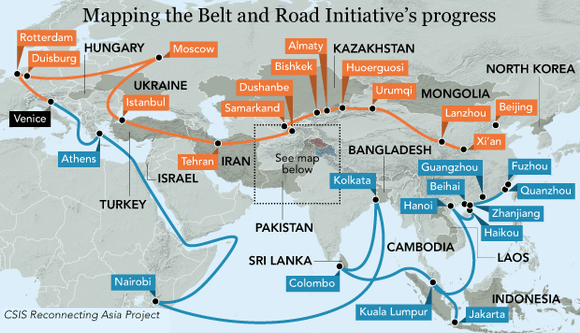
The World Bank (WB) in its latest ‘Global Economic Prospects’ report released on Tuesday has warned: The global economy is on track for its worst five-year period of growth in at least three decades.
This year, global growth is expected to decline for a third year in a row, making the economic performance in the period between 2020 and 2024 worse than during the years surrounding the 2008-2009 global financial crisis, the Asian financial crisis of the late 1990s, and the downturns in the early 2000s, WB Deputy Chief Economist Ayhan Kose told reporters.
According to the WB, growth in the world economy is set to drop to 2.4% in 2024, from the 2.6% recorded last year amid increased geopolitical tensions and an anticipated slowdowns in advanced economies.
Escalation of the Ukraine and Israel-Hamas conflicts “could have significant implications for energy prices that could have impacts on inflation, as well as on economic growth,” Kose told CNBC.
The report warned that most world economies are set to grow at a weaker pace in 2024 and 2025 than in the previous decade, adding that without a “major course correction,” the 2020s will go down as “a decade of wasted opportunity.”
According to the WB, developing economies are expected to be the hardest hit on a medium-term basis as sluggish global trade and tight financial conditions weigh heavily on growth.
“Near-term growth will remain weak, leaving many developing countries — especially the poorest — stuck in a trap: with paralyzing levels of debt and tenuous access to food for nearly one out of every three people,” WB Group Chief Economist Indermit Gill said in a statement.
The U.S. economy, which saw 2.5% growth last year, is forecast to expand by a mere 1.6% in 2024 as restrictive monetary policy dampens business activity amid shrinking savings, the WB said.
Meanwhile, the Eurozone’s outlook for this year is considerably bleaker, with growth expected at just 0.7% after the ramifications of the energy crisis resulted in 0.4% growth in 2023.
Bloomberg Warns – China Could Trigger Global Trade War
Bloomberg analysts have warned on Monday: China’s decision to focus its economic efforts on manufacturing could provoke a new trade war with other global industrial powers.
With growth dampened by economic troubles such as the lingering effects of the Covid-19 pandemic and the real-estate sector crisis that has plagued the country for the last two years, Beijing has begun to invest heavily in manufacturing.
This strategy is reflected in the sharp increase in lending to industrial enterprises, which soared by 38.2% year-on-year in the first three quarters of 2023, according to data from China’s central bank. In comparison, outstanding loans to the property sector fell by 0.2% in the same period.
Overall investment in the manufacturing sector also jumped, by 6.3% in the first nine months of 2023 year-on-year and by 11.3% in high-tech manufacturing in particular, according to data from China’s National Bureau of Statistics.
China has attained a surplus of manufactured goods that has reached around 2% of global GDP, a level unseen since the U.S. after World War II, according to Bloomberg Intelligence. Analysts estimate that about 45% of China’s manufactured goods are exported, from cars to washing machines, since domestic demand is unable to keep up with output. Beijing has been particularly successful in producing and exporting electric vehicles, batteries, and solar panels. The value of such exports grew 42% year-on-year in the first three quarters of 2023, according to official statistics.
While the focus on manufacturing has so far helped the country avoid a recession similar to what befell the US following its own housing market meltdown in 2008, it risks creating imbalances in global production that could lead to increased trade tensions with other countries, analysts warn.
Beijing’s focus on “industrial upgrading” is curtailing imports from countries such as Germany, South Korea, and Japan, which used to provide Chinese factories with hi-tech components. It could also lead to an oversupply of goods “in industries that China is investing in very heavily,” as U.S. Treasury Secretary Janet Yellen warned in November.
“The positive element of this is that there are gonna be some technological success stories. That’s good… The problem with that is, there’s a big question to how much the rest of the world is gonna put up with ever-growing Chinese trade surpluses. And you’re already starting to see some protectionist backlash,” Arthur Kroeber, head of research at economic consultancy Gavekal Dragonomics, told Bloomberg. This backlash is already apparent in U.S. efforts to deny China access to its advanced technology and the EU’s recent probes into Chinese electric vehicles, analysts say.
















































